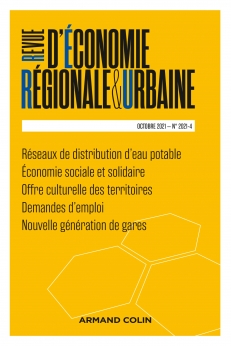
REVUE D'ÉCONOMIE RÉGIONALE ET URBAINE (4/2021)
Pour acheter ce numéro, contactez-nous
Recevez les numéros de l'année en cours et accédez à l'intégralité des articles en ligne.
Dans un contexte où l’analyse conjoncturelle est devenue un enjeu majeur pour les décideurs privés et publics au niveau national, l’étude des cycles des grands agrégats macroéconomiques est également un sujet important au niveau régional. En effet, cette analyse cyclique régionale permet de renseigner et d’identifier les caractéristiques idiosyncratiques d’un territoire, dans notre cas, la région Pays de la Loire et ses départements. L’objet de cet article est d’étudier le cycle mensuel des demandeurs d’emploi en examinant leurs cycles classiques. Nous proposons ainsi une datation de leurs points de retournement cyclique sur la période de 1996 à 2019. Les résultats montrent des similitudes entre les départements, mais aussi des différences, notamment sur le fait que certains départements subissent davantage les effets des récessions économiques.
The analysis of the cycles of major macroeconomic aggregates is important for policy-makers and analysts not only at a national level but also at a regional level and even at a departmental level. Indeed, this cyclical analysis can inform and identify the idiosyncratic characteristics of a territory. The aim of this article is to study the monthly cycle of jobseekers in the Pays de la Loire region and its departments by examining both businesses, also known as the classical cycle. Following the theoretical and empirical foundations of the National Bureau of Economic Research and the seminal work of Burns and Mitchell, we propose a monthly chronology of these cycles during the period 1996-2019. In addition, we examine in detail the characteristics of the duration, amplitude and depth of employment cycles. We also calculate an innovative measure of department synchronisation using the modified Moran Index. The results show that some departments are more affected by economic recessions and therefore lag behind in exiting the "expansion", also known as the turning point of the cycle. To conclude, we found that departmental cycles in the Pays de la Loire region were more synchronised after 2008. We believe that the creation of Pôle Emploi, the national employment agency in charge of unemployment compensation and jobseeker assistance, is partly responsible for improving intra-departmental cyclical synchronisation. Indeed, the integration of skills in job placement and monitoring of jobseekers with this compensation would have had a positive effect on local coordination allowing for greater effectiveness of employment policies in general.